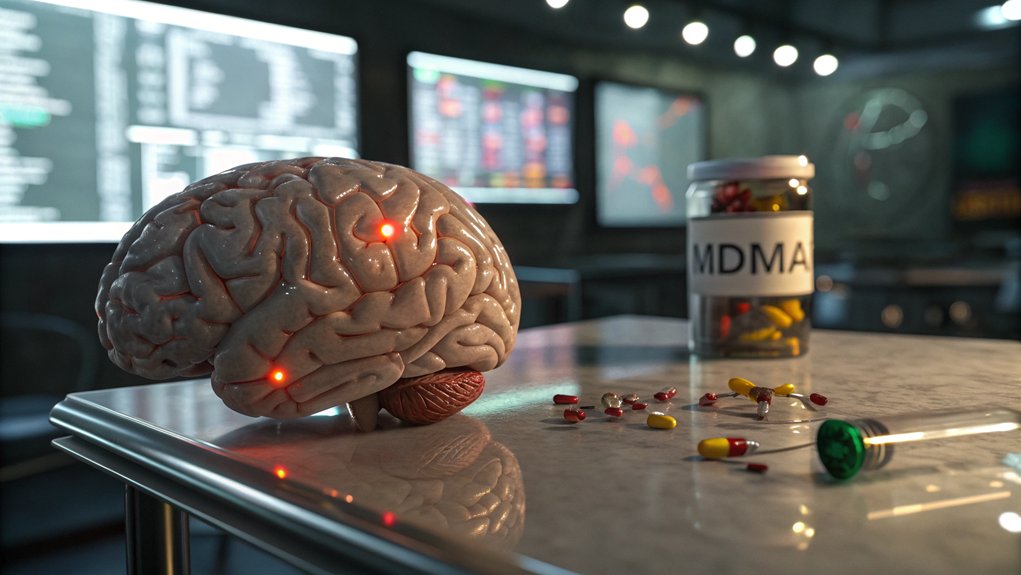Link Between MDMA and Memory Loss

Prefer listening? Check out the podcast version of this article.
You’ve likely heard about the party drug MDMA, often used for its euphoric effects, but have you considered its impact on memory?
It’s not just a temporary fog; MDMA can cause significant memory impairment, both immediately and in the long run.

This isn’t merely about forgetting where you left your keys—chronic users face deeper issues, like challenges in forming and recalling memories.
The drug’s effect on serotonin release and its impact on your brain’s hippocampus might explain why.
But can these memory deficits be reversed, or do they become a permanent part of your cognitive landscape?
Table of Contents
Immediate Memory Effects
When you consume MDMA, its immediate impact on memory is significant and evident almost right away.
The acute impairment primarily affects your verbal memory, making it challenging to form new memories or recall information.
This is due to the massive serotonin release triggered by MDMA, which leads to a temporary depletion of this crucial neurotransmitter.
Discover Your Path to a Longer, Healthier Life!
Take our free quiz to see how your lifestyle measures up to the world's longest-living communities and receive expert tips for a healthier, longer life.
Take the QuizThe serotonin surge and subsequent drop disrupt normal brain function, impairing memory processes.
Studies indicate that users often struggle with tasks requiring verbal recall during intoxication.
This transient neurochemical imbalance illustrates the direct correlation between serotonin release and memory dysfunction.
Understanding these acute effects is vital for comprehending how MDMA impairs cognitive functions, emphasizing the need for awareness of its immediate neurological consequences.
Long-Term Memory Changes
Although the immediate effects of MDMA on memory are concerning, the long-term consequences are even more significant.
Chronic use leads to persistent cognitive decline, particularly affecting your ability to form and recall memories.
Research demonstrates that regular MDMA users face substantial long-term consequences, with impairments persisting well beyond cessation of use.
You may struggle with spatial navigation and recalling names, reflecting broader cognitive decline.
These deficits often remain evident for weeks, and sometimes longer, indicating enduring changes in memory function.
The extent of these long-term consequences can vary based on usage patterns and individual differences.
Understanding these impacts is crucial, as they can significantly interfere with daily tasks, academic pursuits, and professional responsibilities, underscoring the importance of addressing MDMA-related memory impairment.

Neurobiological Impact
MDMA’s neurobiological impact is primarily rooted in its profound effects on the serotonergic system, which plays a critical role in memory and cognitive function.
When you consume MDMA, it triggers serotonin depletion by releasing large amounts of serotonin and subsequently exhausting neuronal stores.
This depletion disrupts normal neurotransmission, impairing cognitive processes.

The neurotoxicity pathways of MDMA involve oxidative stress and mitochondrial dysfunction, leading to the generation of reactive oxygen species that damage serotonergic neurons.
This damage is particularly significant in the hippocampus, a crucial region for memory formation.
The neurotoxic effects compromise synaptic integrity, altering cognitive functions long-term.
Understanding these mechanisms is vital for assessing the risks of MDMA use, as it elucidates the underlying causes of memory impairment.
Memory Types Affected
Memory impairment from MDMA use manifests differently across various types of memory.
You’ll notice significant challenges in working memory, which involves the temporary holding and manipulation of information for cognitive tasks.
This means simple tasks like mental math or following directions might become difficult.
MDMA also disrupts declarative memory, the ability to recall facts and events, making it harder to remember names, dates, or even past experiences.
Research consistently shows that both acute and chronic MDMA users face notable impairments in these areas.
The drug’s impact on serotonergic neurons, crucial for memory processing, underlies these deficits.
This evidence highlights the broad scope of memory types affected, complicating everyday cognitive functions and long-term information retention for users.
Prevention and Risk Reduction
Understanding how to prevent MDMA-related memory damage is crucial for both potential users and healthcare providers.
The most effective prevention strategy remains complete abstinence, but harm reduction approaches are essential for those who might choose to use MDMA despite the risks.
Research indicates that several factors influence the severity of memory impairment, including dosage, frequency of use, and environmental conditions during consumption.
Higher doses and frequent use patterns significantly increase the risk of severe memory deficits, making dose control a critical factor in harm reduction.
The environment where MDMA is consumed plays a vital role—high temperatures and crowded spaces can exacerbate neurotoxicity through increased body temperature, which amplifies MDMA’s harmful effects on memory-related brain regions.
Proper hydration is essential, but overhydration can be equally dangerous due to the risk of hyponatremia, a potentially fatal condition where blood sodium levels become dangerously low.
Pre-loading and post-loading with supplements like antioxidants may help minimize oxidative stress damage, though evidence remains limited and controversial.
Regular monitoring of cognitive function through memory tests can help identify early signs of impairment, allowing for timely intervention.
Education about drug interactions is crucial, as combining MDMA with other substances, particularly alcohol or other stimulants, can dramatically increase the risk of memory-related complications.
Healthcare providers recommend maintaining adequate rest periods between uses—typically several months—to allow the brain’s serotonin system to recover and minimize cumulative damage.
Understanding your genetic predisposition to MDMA sensitivity through medical consultation can help assess personal risk levels for memory impairment.

Implementation of these preventive measures requires a comprehensive approach, combining individual responsibility with proper medical guidance and support systems.
Treatment and Intervention Strategies
When memory impairment from MDMA use becomes evident, various treatment approaches can help manage and potentially improve cognitive function.
The complexity of MDMA-induced memory deficits requires a multi-faceted treatment strategy.
Medical professionals typically begin with a comprehensive cognitive assessment to determine the extent of memory impairment.
This evaluation helps create targeted intervention plans based on specific deficits identified in working memory, verbal recall, or spatial processing.
Cognitive Behavioral Therapy (CBT) has shown promising results in helping individuals develop compensatory strategies for memory difficulties.
These techniques might include:
- Memory organization systems
- External memory aids like digital reminders
- Note-taking strategies
- Visual association techniques
- Routine-building exercises
Pharmaceutical interventions, while still experimental, are being researched for their potential in treating MDMA-related memory impairment.
Some medications that modulate the serotonin system have shown promise in preliminary studies, though their long-term efficacy remains under investigation.
Neuroplasticity-based interventions focus on rebuilding neural pathways through targeted cognitive exercises. These might include:
- Memory training games
- Pattern recognition exercises
- Spatial navigation tasks
- Verbal recall practice sessions
- Sequential learning activities
Physical exercise has emerged as a valuable complementary treatment, as it promotes neurogenesis and improves blood flow to memory-related brain regions.
Regular aerobic activity can enhance cognitive function and potentially speed up recovery from MDMA-induced memory deficits.
Nutritional intervention plays a crucial role in treatment strategies.
Key nutrients that support cognitive recovery include:
- Omega-3 fatty acids for neural repair
- B-vitamins for neurotransmitter production
- Antioxidants to combat oxidative stress
- Amino acids for neurotransmitter precursors
- Minerals essential for neural function
Professional support groups and cognitive rehabilitation programs offer structured environments for recovery.
These programs often combine multiple therapeutic approaches while providing peer support and accountability.
The timing of intervention is crucial—early recognition and treatment of memory impairment typically leads to better outcomes.
Healthcare providers recommend regular monitoring and adjustment of treatment strategies based on progress and individual response.
Integration of mindfulness and stress-reduction techniques can support treatment efficacy, as stress can exacerbate memory difficulties and impede recovery.
These practices help maintain cognitive clarity and emotional balance during the recovery process.
Family and social support systems play vital roles in treatment success, helping individuals maintain consistency in their recovery efforts and providing necessary emotional support during the challenging process of cognitive rehabilitation.
Occupational therapy may be necessary for individuals experiencing significant impact on their daily activities, helping them develop practical strategies to manage work and personal responsibilities while recovering.
Recovery Possibilities
While the potential for recovery from MDMA-induced memory impairment exists, the extent and speed of such recovery can vary significantly among individuals.
Abstinence from MDMA is the most effective recovery strategy, allowing the brain’s neurochemistry to gradually stabilize.
Lifespan Comparison Tool
Compare the life expectancy by the U.S. State
Studies show abstinence benefits include partial restoration of serotonin function, which is crucial for memory processes.
Cognitive rehabilitation techniques may further aid recovery, focusing on enhancing cognitive skills and compensating for deficits.
However, the degree of recovery is influenced by factors such as duration of MDMA use and individual neurobiological resilience.
Neuroimaging studies highlight that some structural changes in the brain may remain, indicating potential lasting effects.
Thus, while improvements are possible, complete recovery mightn’t be guaranteed for everyone.
Conclusion
You’ve seen how MDMA disrupts memory, both immediately and over time.
Some might argue the effects aren’t severe or lasting, but evidence clearly shows significant memory impairments due to serotonin disruption, especially in the hippocampus.
While recovery is possible, it’s uncertain and varies greatly among individuals.
Don’t underestimate the risks—understanding the neurobiological impact is crucial.
Memory types like working and declarative are at stake, highlighting the need for caution with MDMA use.

 972-393-1699
972-393-1699





